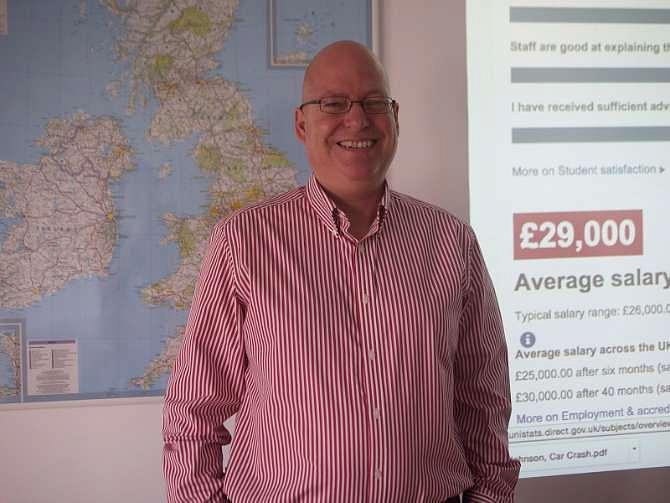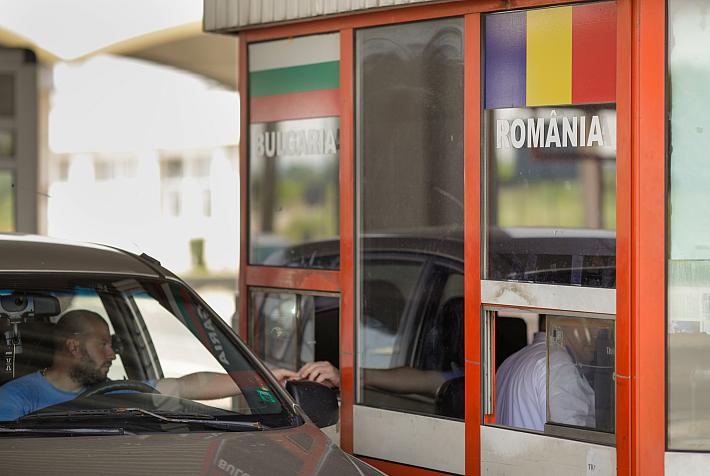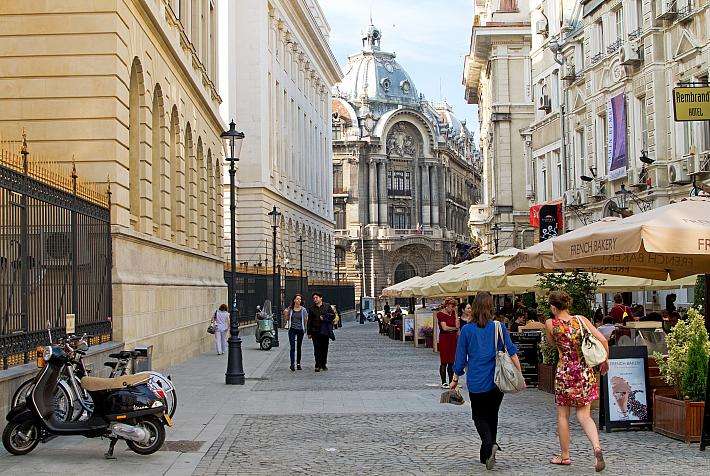The British mountain hiker who helps Romanians choose UK universities: “I want this to be my country”

Simon Parker, a British teacher and trainer, followed his desire to make a change and moved to Romania 12 years ago. Now he’s helping young Romanians make important changes, by counseling them on studying in the UK.
When Simon Parker dropped the keys of his rented farm house in his landlord’s letter box, he knew it meant goodbye to his life in the UK. It was mid-August, 2003, and it was lightly raining. He got in his bright red ex-British army Landrover, full with books and clothes, and started the 10-day drive towards Romania, where a new apartment and a new job as high-school teacher were waiting for him.
He was in his mid ‘30s, but wanted to take a break from his weary job at a college. And like the Brits say, sometimes a change is as good as a rest. While driving his Landrover through Continental Europe and stopping in various countries, he had no idea that in some years he’ll be helping others make important changes in their lives.
It’s end of the hottest day in Romania in several years. It’s about 37 degrees Celsius, but it feels like 44. I enter a room with a big white sofa, where high-school graduates and their parents normally sit when they meet Simon Parker, now in his late 40s. He counsels them about what universities they could attend in the UK. Over 5,600 Romanian students are now enrolled in UK universities.
Simon sits on the smaller sofa. He is facing the balcony, which oversees one of Bucharest’s fanciest boulevards, Dacia, filled with posh cafes and hair salons.
Simon taught for several years in Romanian public and private schools in various cities, then he trained Romanian teachers. Four years ago he founded his own company Albion International Study, which counsels high-school graduates about studying at a UK university.
Wearing a red-and-white stripped shirt, dark-blue trousers and small, rectangle glasses, Simon could look like a regular businessman. But then he greets you with a large, genuine smile, which must be quite comforting for nervous high school graduates trying to make the best university choice.
Simon recently met the director of the Radu Negru high school in Fagaras, a small town in central Romania where he taught for some years. They had coffee and talked about Romanians studying abroad. A lot of people attack the Romanian education system, but the system is doing something right, they concluded. Whatever that is, Romanians are disproportionately represented at Oxford and Cambridge compared to other nations of the same size. Romania sends at least as many students as India does and far more than Germany and France.
But you could argue that the Romanian education system is also doing something wrong, if so many of its best students choose universities abroad. Simon, however, says that parents and students choose British schools because of their tradition and teaching style, and also the equipment. If you take the law school, for example, many British universities do what they call mooting. A moot court is an activity where students take part in simulated court proceedings. Students also offer to do pro bono work for people in the community.
But it’s even more than the British universities’ tradition and better equipment, says Simon. When students reach 18, they want to spread their wings and experience a different culture. It’s the desire to make a change that may sneak into a person’s heart any time in a lifetime. Simon made that change when he was 35 and moved to Romania, but these young people are confident and prepared to make that massive change earlier.
His life in Romania as a teacher and trainer, and now as a company owner, brought him more self-confidence. You understand a country’s cultural language, you know a different way of doing things. “The brain reprograms itself, and the experience makes the brain more flexible. You become cultural bilingual,” Simon says.
When he’s not working, Simon is in the Romanian mountains, hiking. He’s done the Bucegi mountains, a little bit of the Rodnei mountains. He mentions a British writer who said there was an amazing juxtaposition with Romanian mountains between the urban, the touristic and the wild.
“Take a place like Sambata de Jos. You’ve got a monastery, little shops, but within 20 minutes of walking away from that you are in the wilderness, nobody around. It’s like one of those fantasy series. You walk through a door and you are in a different world. There’re very few places in Europe where the transition is that fast and that dramatic.”
The Romanian mountains are so different, Simon goes on. In the Faragas mountains you are constantly alert. There is a deep, dark feeling when you’re walking there, whereas somewhere like Ciucas, it’s very friendly. He says he’s done some great winter hikes there, and then he adds: “I can see myself retiring here. I can see myself doing another 15 years of teaching, not having any desire to leave.”
“I would say I’m immigrant, rather than expat,” Simon says. For him, the word immigrant indicates that he’s here to stay, whereas expat means something temporary. “I know a lot of people who would present themselves as immigrants. We have chosen to actively immigrate to your country and stay and to become part of your country. I identify with Romania, I am choosing to live here. I want this to be my country, if your country accepts me.”
Unlike many Romanians and even foreigners, Simon likes Bucharest. He has a soft spot for the capital, he says laughing. He has heard many people saying, ‘Oh..poor you, you live in Bucharest’, but Simon thinks Bucharest is big enough to find your own Bucharest. It’s also a big enough city not to stand out and to find a group of like-minded people. He likes the parks and the old buildings.
Simon has a meeting, so we end our interview. Days later, he posts pictures from the mountains on his social media account. He went hitchhiking again. “I’ve got a lifetime of mountains left to hike in your country,” he said laughing during the interview.
By Diana Mesesan, diana@romania-insider.com, features writer
(photos by Diana Mesesan)














